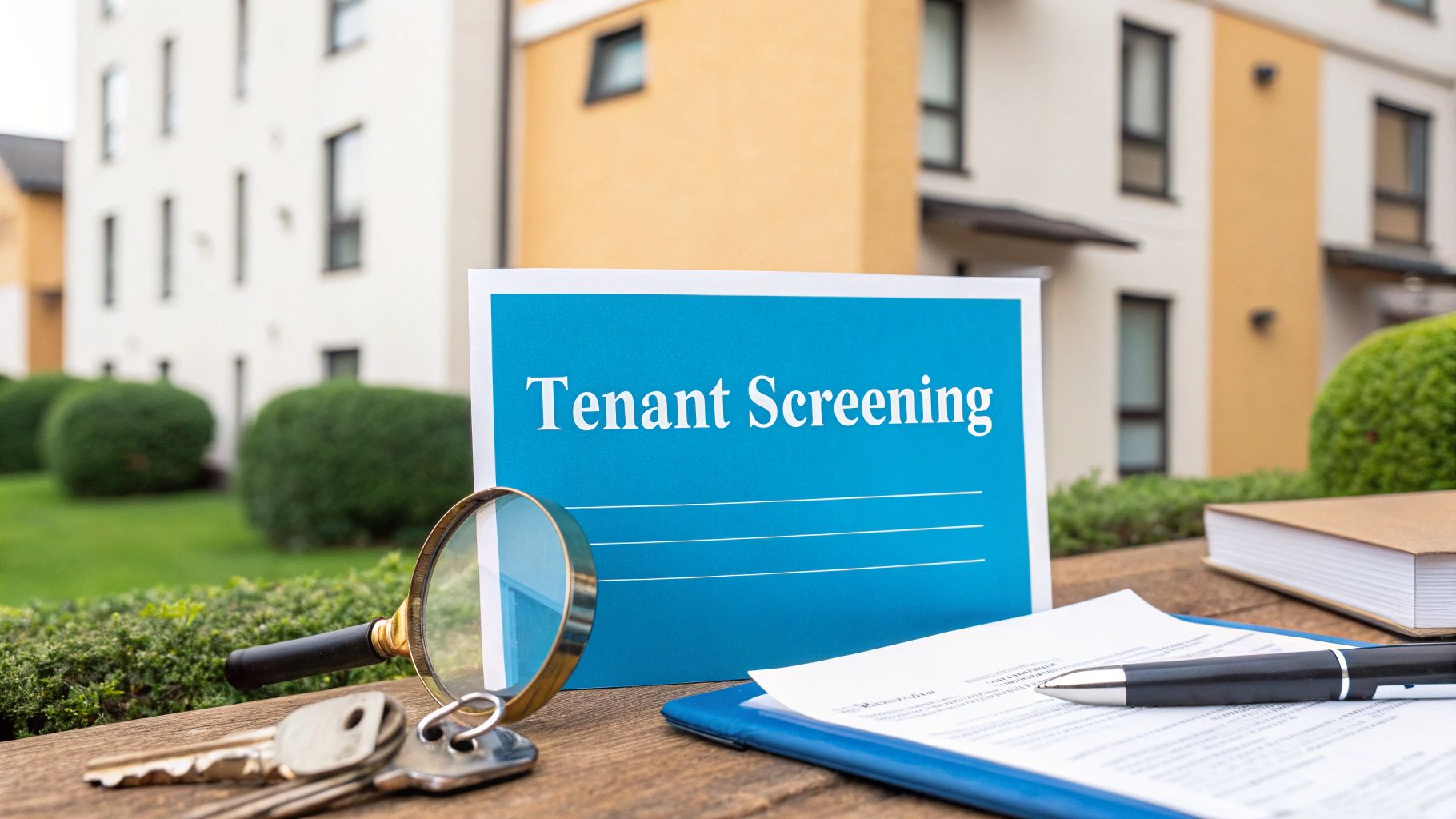Why Background Checks For Renters Is Your Best Investment
Finding reliable tenants is crucial for a successful rental business. It's the difference between consistent income and ongoing stress. A thorough background check acts as a safety net, protecting your investment and providing valuable peace of mind. This proactive measure shields you from potential financial and emotional burdens caused by problematic tenants.
The True Cost of Bad Tenants
The repercussions of placing a bad tenant can be significant. Beyond late rent payments, consider the possibility of extensive property damage, expensive eviction processes, and even legal disputes. These scenarios can quickly diminish your profits and disrupt your peace. For example, imagine a tenant consistently paying late, forcing you to use your savings to cover mortgage payments and other expenses. This financial strain can escalate rapidly, putting your investment at risk.
Additionally, consider the emotional impact. Dealing with constant complaints, property damage, and the stress of evictions can be incredibly draining. A thorough background check helps mitigate these risks by providing insights into a potential tenant’s rental history.
Background Checks: A Proactive Approach
Smart landlords understand that background checks aren't an expense, but an investment. They provide crucial information that helps identify red flags early in the process. This proactive approach lets you avoid costly mistakes and choose tenants who are more likely to respect your property, pay rent on time, and follow the lease terms.
This emphasis on thorough screening has become increasingly common among landlords. In fact, according to a 2025 survey by RentRedi and BiggerPockets, nearly half of the approximately 1,000 landlord respondents stated that background checks were the most important factor in their tenant selection process. This highlights the growing recognition of background checks as an essential tool for protecting rental investments. Find more detailed statistics here
Identifying Warning Signs
Background checks reveal important details about a prospective tenant's past, including their credit history, criminal record, and rental history. This information helps you identify potential problems, such as a history of evictions, late payments, or criminal activity. By carefully evaluating these factors, you can make informed choices and select tenants who are more likely to be responsible and dependable.
Imagine two applicants: one with a consistent record of on-time rent payments and positive references, and another with multiple evictions and inconsistent employment. The background check lets you clearly distinguish between these candidates and select the one who best suits your needs. This careful selection process is vital for protecting your investment and ensuring a positive rental experience.

What Actually Matters in Tenant Background Screening
Not all tenant background checks are the same. Knowing what to look for protects you from costly mistakes and helps you find reliable tenants. This means going beyond just a credit score and examining the full picture of a potential renter.
Key Components of a Thorough Background Check
An effective background check delves into several crucial areas:
Criminal History: This assesses potential safety risks. It’s important to interpret records contextually, considering the severity and recency of offenses, along with applicable Fair Housing laws.
Credit History: This offers insights into financial responsibility and the likelihood of on-time rent payments. Look for patterns of late payments, collections, or bankruptcies.
Employment Verification: This confirms income stability and helps avoid tenants with fraudulent applications. Note any gaps in employment and inconsistencies with the application.
Rental History: Past rental behavior is a strong predictor of future behavior. Look for evictions, broken leases, or frequent disputes with past landlords. You might be interested in: How to master prospect screening and find ideal tenants.
Public Records: This can reveal bankruptcies, liens, or judgments that might affect a tenant’s ability to pay rent.

The infographic above visualizes the key steps in a thorough tenant background check. This ensures you gather all essential information for informed decisions. By checking multiple data points and corroborating applicant-provided information, landlords gain a holistic view of a potential tenant’s reliability.
To better understand the various components of a background check, let's look at the following comparison:
Background Check Components Comparison
This table provides a detailed comparison of different background check elements, their importance ratings, and the information they provide to landlords.
This comparison highlights the key information each check provides and the importance of adhering to legal guidelines.
Evaluating Rental History and Employment
A thorough background check includes contacting previous landlords. This offers valuable firsthand insights into a potential tenant's behavior, including property treatment and communication. This can be more revealing than a simple eviction record. For example, a previous landlord might reveal a history of late payments or frequent complaints, even without eviction.
Similarly, verifying employment confirms income stability. A call to the employer can confirm the applicant’s current position and salary, helping you avoid tenants who misrepresent their income. This step is critical for ensuring a tenant can consistently meet rent obligations.
Weighing the Factors for Informed Decisions
The relative importance of these factors can vary. For a high-end property, you might prioritize credit history and income verification. For properties in areas with low vacancy rates, you might have more flexibility with rental history. It’s important to develop clear criteria tailored to your property and market. This allows for consistent and objective applicant evaluation. By thoroughly assessing each potential tenant, you're proactively protecting your investment and building a positive landlord-tenant relationship.
Staying Legal While Screening Smart
Navigating the complexities of tenant background checks requires a keen understanding of applicable laws. This means balancing your need for information with the applicant’s legal rights. Making a mistake can expose you to discrimination claims, potentially damaging your business and reputation. This section offers practical guidance for conducting compliant background checks.
Understanding Fair Housing Laws
Federal Fair Housing laws prohibit discrimination based on race, color, religion, national origin, sex, familial status, or disability. This means your screening criteria must be consistently applied to all applicants, regardless of their background. For example, rejecting an applicant solely for being a single parent or belonging to a particular religious group violates Fair Housing laws and exposes you to legal action.
Additionally, using criminal background information requires careful consideration. While you can consider criminal history, you must do so without disproportionately impacting protected groups. This means evaluating the nature and recency of offenses, not simply implementing blanket bans.
State and Local Regulations
Beyond federal laws, be aware of specific state and local regulations that may further restrict your screening process. Some states limit how far back you can look into an applicant’s history or the types of information you can access. For instance, some states have “ban-the-box” laws that restrict inquiries about criminal history on initial applications. Staying informed about these local nuances is crucial for legal compliance.

Essential Disclosures and Consent
Before conducting a background check, obtain written consent from the applicant. This demonstrates transparency and respects their rights. Clearly disclose what information you will access and how you will use it. This includes specifying the screening service you will use and the criteria you will apply to their application. This clear communication fosters a professional landlord-tenant relationship.
Common Legal Pitfalls and How to Avoid Them
One common pitfall is using overly broad or subjective screening criteria. Define your criteria clearly and objectively. Documenting your screening process, including the rationale behind your decisions, helps protect you from potential claims. This includes keeping copies of applications, background checks, and all communication with the applicant.
Another common mistake is failing to provide adverse action notices when required. If you deny an application based on a background check, you must provide the applicant with an Adverse Action Notice. This notice informs them of their rights under the Fair Credit Reporting Act (FCRA) FCRA and details the information used in your decision.
By understanding the legal landscape and implementing these best practices, you can conduct background checks that are both effective and legally sound. This proactive approach protects your investment and promotes fair housing principles.
Finding the Right Screening Service for Your Needs
Choosing the right tenant screening service is crucial for protecting your rental investment. With so many options available, understanding the key factors for comparison is essential. A poor choice can compromise your entire screening process, potentially leading to problematic tenants and financial losses. This guide will help you navigate the decision-making process and find the service that best fits your needs.
Essential Features and Functionality
A comprehensive screening platform should go beyond basic online checks. Look for features that enhance your tenant selection process and provide a complete picture of an applicant's background. Instant credit checks, criminal background searches, and eviction history reports are fundamental components of any reliable service. Access to national databases like TransUnion and customizable screening criteria can significantly improve your ability to identify potential issues. These features allow you to tailor the screening process to your specific requirements and risk tolerance.
Beyond these core features, some services offer additional tools like income verification and rental history reports. This added information can help you make more informed decisions, especially when dealing with applicants with limited credit history or rental experience. Remember to balance the need for comprehensive information with applicant privacy and Fair Housing laws.
Pricing Models and Turnaround Times
Different services offer various pricing structures, from per-screening fees to monthly subscriptions. Evaluate these options based on your property portfolio size and budget. A landlord with a few properties might find a pay-per-screen model more cost-effective, while a large property management company might benefit from a subscription service. Turnaround times are also important. Faster reports mean quicker tenant placement and shorter vacancy periods. A service with fast, reliable reporting can be a significant advantage in competitive rental markets.
The global background check market is expanding rapidly, fueled in part by the demand for these services. In 2021, the market size was approximately $5.40 billion USD and is projected to reach $10.92 billion USD by 2029. Learn more about this growth. This underscores the increasing importance of background checks across various sectors, including tenant screening, as landlords increasingly rely on these checks to assess potential tenants.
Accuracy and Reliability
The accuracy of the information provided is paramount. Look for services that partner with reputable credit bureaus like Experian and use comprehensive databases. Inaccurate reports can lead to unfair decisions and potential legal problems. Reading reviews and comparing the data sources used by different providers can help you evaluate their reliability.
Hidden Costs and Limitations
Before committing to a service, understand any hidden costs or limitations. Some providers may charge extra for certain reports or features, while others might limit the number of screenings you can conduct. Carefully review the terms of service to avoid unexpected charges and ensure the service meets your long-term needs. Look for providers with excellent customer support to assist with any issues. Switching services can be a hassle, so making the right choice initially is important. By considering these factors, you can find the perfect screening service to protect your investment and streamline the tenant selection process.
Spotting Red Flags That Matter
While receiving a background check report might feel like the end of the tenant screening process, it's really more of a starting point. The report itself is just raw data; the true value lies in accurately interpreting it. This involves identifying subtle warning signs that could predict future issues, and differentiating between minor blemishes and significant red flags.
Identifying Patterns of Concern
A single instance of late payment might not be a major issue, but multiple late payments across several accounts could suggest a pattern of financial instability. Similarly, a minor offense from years ago might not be relevant, but a recent history of similar offenses warrants closer attention. Look for patterns and connections within the report that tell a bigger story than individual data points. To simplify property management tasks, consider using website management services.
Financial Instability Indicators
Go beyond just credit scores and delve deeper into the applicant’s financial history. Frequent changes of address, inconsistent employment, and a history of collections or judgments can paint a picture of financial instability. This instability significantly increases the risk of late rent or even evictions. For example, an applicant with multiple addresses in a short period, combined with gaps in their employment history, might indicate a transient lifestyle that could make consistent rent payments challenging.
Criminal History Context
When evaluating an applicant's criminal history, consider the nature, severity, and recency of the offenses. A decades-old misdemeanor for a minor infraction carries less weight than a recent felony conviction. Remember to adhere to Fair Housing laws and avoid discriminatory practices. Focus on offenses directly relevant to tenancy, such as property damage or drug-related offenses, and assess their importance based on the specific context.
Inconsistencies and Potential Fraud
Carefully review the report for any inconsistencies between the rental application and the background check information. Discrepancies in addresses, employment history, or income could indicate an attempt to falsify information. For instance, if an applicant claims a high income but their credit report reveals significant debt and a history of late payments, this discrepancy requires further investigation. For more information about rental scams, read: How Showdigs is solving the growing epidemic of rental scams.
When Further Verification Is Needed
If the background check reveals any concerning details or inconsistencies, don't hesitate to conduct additional verification. Contact previous landlords directly to discuss the applicant’s rental history and confirm employment and income with their employers. This extra step can provide valuable insights that aren't always apparent in standard reports. These conversations can often uncover patterns of behavior, such as frequent late payments, property damage, or disputes with neighbors, that a written report might not reveal.
Balancing Thoroughness and Fairness
Establish clear, objective criteria for evaluating background check results. These criteria should align with your personal risk tolerance and comply with local laws while upholding fair housing principles. Document your decision-making process meticulously to ensure transparency and provide legal protection. This documentation also creates a useful record for future reference. By striking a balance between thorough screening and fair practices, you can protect your investment while simultaneously attracting and retaining responsible tenants. This careful approach helps cultivate positive landlord-tenant relationships and builds a successful rental business.
Building a Professional Screening System
Transforming your tenant screening process from random to systematic is vital for dependable results. This means going beyond a simple background check and creating a structured approach. This structured approach streamlines your workflow while upholding thorough evaluation standards. A professional screening system not only leads to better tenants but also attracts stronger applicants from the start.
Standardized Criteria: Eliminating Guesswork
Developing standardized criteria forms the bedrock of a professional screening system. This means setting clear, objective requirements for income, credit score, rental history, and criminal background. For instance, you might require a minimum credit score of 650, verifiable income three times the rent, and no evictions in the past five years. These predefined benchmarks eliminate guesswork and promote fair evaluation of every applicant.
Efficient Workflows: Saving Time Without Cutting Corners
Once you've established your criteria, create a smooth, efficient workflow for each step of the screening process. This could include using online application forms like those offered by AppFolio, automating reference checks with a service like RentPrep, and integrating with background check providers such as TransUnion SmartMove. This streamlined approach saves valuable time without compromising thoroughness. Check out our guide on How to master property management operations for additional efficiency tips.
Professional Communication: Maintaining a Positive Image
Professional communication is paramount throughout the tenant screening process. Respond to applicants promptly, keep them updated on their application status, and offer clear explanations for your decisions. Respectful communication not only demonstrates professionalism but also cultivates a positive image for your business. This positive experience can attract high-quality tenants in the future.
Handling Multiple Applications and Additional Information
A robust screening system must address handling multiple applications fairly. Consider implementing a scoring system based on your pre-determined criteria to objectively rank applicants. This promotes transparency and helps select the best fit for your property. Also, establish a clear process for gathering supplemental information, like contacting previous landlords or verifying employment. This extra step can prevent costly mistakes down the road.
Documentation: Protecting Your Decisions
Meticulous documentation is crucial. Maintain detailed records of all applications, background checks, communication with applicants, and the reasoning behind your decisions. Comprehensive documentation provides legal protection and serves as a valuable resource for future tenant selections.
To help visualize the process, the table below outlines a typical timeline and checklist for tenant screening:
To help visualize the process, the table below outlines a typical timeline and checklist for tenant screening:
Tenant Screening Timeline and Checklist
Step-by-step timeline showing the optimal sequence for conducting background checks and tenant evaluation
This table provides a framework for a streamlined and organized screening process. Remember to adapt the timeline based on your specific needs and local regulations.
By implementing these strategies, you’ll build a professional screening system that strengthens your tenant selection process and contributes to your long-term success as a landlord. This systematic approach frees you to focus on other aspects of your business, confident that your tenant screening process consistently delivers reliable results.
Making Confident Rental Decisions
The ultimate goal of a background check for renters is to give you the power to make smart, justifiable decisions. This protects your investment while ensuring you treat applicants fairly. It means putting all the information together to get a clear picture, allowing you to confidently choose reliable tenants.
Creating a Decision Framework
A structured decision framework is key to consistently applying your screening criteria. This framework should outline how you'll weigh different factors based on the screening results. For example, you might prioritize credit history for higher-priced rentals, while focusing more on rental history for properties in high-demand areas. Knowing when to request additional information, like speaking directly with previous landlords, is also crucial. Building a professional screening system can be complex; consider companies in the custom security products industry for assistance.
Setting Approval Criteria
Your approval criteria should reflect your risk tolerance and follow all applicable laws. Clearly define your minimum acceptable standards for credit score, income, and rental history. This creates a clear benchmark for evaluating each applicant. For example, you could require a minimum credit score of 650, verifiable income three times the rent, and no evictions in the past five years.
Handling Borderline Cases
Not every application will be a simple yes or no. Some applicants may be borderline cases requiring extra thought. Perhaps an applicant has a great credit score but a limited rental history. In these situations, asking for additional references or a larger security deposit could lessen the perceived risk. This flexibility lets you consider promising applicants while still safeguarding your investment.
Communicating Decisions Professionally
Communicate your decisions promptly and professionally, no matter the outcome. For approved applicants, clearly explain the next steps in the leasing process. For denied applicants, give a clear and respectful explanation. State the specific reasons for the decision while complying with Fair Housing laws. This professional approach maintains your reputation and builds trust with potential tenants.
Maintaining Detailed Records
Keep thorough records of your entire screening process. This includes applications, background checks, all communication with applicants, and your reasoning behind each decision. Detailed documentation protects you from disputes and offers valuable insights for future decisions. Think of this record-keeping as building a solid base for a smooth and successful rental business.
Ready to simplify your leasing process and find the perfect tenants? Showdigs, the AI-backed leasing automation platform, helps you automate showings, manage leads, and conduct thorough background checks—all in one place. Learn more about how Showdigs can transform your rental business at https://showdigs.com.





.png)

.png)